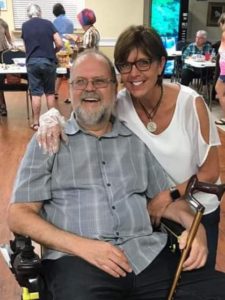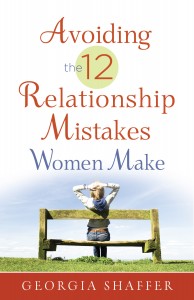A True Love Story that Unlocks the Secret of How to Overcome –
 I still remember that first phone call from Jolene as she described the situation in her marriage that was causing her such heartache. Her husband’s life and hers were going in two different directions as their expectations diverged and their emotional needs increasingly went unmet. She had tried to get Rick to understand why she was unhappy and what he was doing that was causing such anxiety, hurt, and discouragement. But he simply didn’t get it.
I still remember that first phone call from Jolene as she described the situation in her marriage that was causing her such heartache. Her husband’s life and hers were going in two different directions as their expectations diverged and their emotional needs increasingly went unmet. She had tried to get Rick to understand why she was unhappy and what he was doing that was causing such anxiety, hurt, and discouragement. But he simply didn’t get it.
When she called me, she was ready to walk away from the marriage.
“Do you think Marriage 911 would help us?” she asked. “Is ours the type of situation that would benefit from your class?”
I told her I believed it would. And so they came . . . even though Rick still didn’t understand Jolene’s concern. During those thirteen weeks they faithfully went through the Marriage 911 workbook with the class and participated in their individual small groups. Jolene stayed strong, believing God would break through their gridlock as she read Broken Heart on Hold and allowed God to nurture her heart.
Rick struggled honestly to understand, and then somewhere in the middle of the class, my husband Marv, the leader of Rick’s group, spoke words that illuminated a new understanding in Rick’s mind. A light went off. For years afterward, Rick not only remembered my husband’s words verbatim, but repeated them regularly every time he spoke of this incident. “It’s the appearance of impropriety . . . even though it’s not actual impropriety, it’s the appearance of impropriety.” Once he heard the words, the words popped. He saw it. He got it!
As the thirteen weeks wore on, Jolene’s smile grew more radiant as she began to understand Rick’s new appreciation for her concerns. Their communication began to improve. By the end of the class, their marriage had taken a new turn toward wholeness and healing.
Wanting More Joy for the Journey
But Rick and Jolene weren’t satisfied to stop at merely fixing the problem. They wanted more for their marriage. They wanted to avoid any other slips into miscommunication. They had heard enough stories and learned enough to know more was possible. They didn’t want just an okay marriage or even a good marriage. They wanted a fantastic marriage. They wanted to experience true joy for the journey as they traveled this life together. And they were willing to do whatever necessary to pursue that dream.
They went on a weekend retreat called Retrouvaille where they learned to communicate more clearly and connect with each other’s hearts. They took more marriage classes like Love and Respect, Marriage Oneness and others and read books to grow their relationship. They went on a weekend retreat called Weekend to Remember sponsored by Family Life, which took them to a whole new level of appreciation for one another. One of their favorite romantic adventures was going on a Love Like You Mean It Marriage Cruise, sponsored by Family Life.
to grow their relationship. They went on a weekend retreat called Weekend to Remember sponsored by Family Life, which took them to a whole new level of appreciation for one another. One of their favorite romantic adventures was going on a Love Like You Mean It Marriage Cruise, sponsored by Family Life.
In the span of about a year they went from a marriage drifting into possible separation or divorce to a marriage that soared with new possibilities. They had found the joy for the journey they’d been looking for.
A Second Phone Call
A little over a year after they had participated in Marriage 911, I received another phone call from Jolene. After telling me about the transformation in their marriage, she told me they now wanted to give back and help others achieve the joy in their marriages like they had found for their own journey. They became leaders in our Marriage 911 class and then began to facilitate other marriage classes as well. They became active in a wonderful Christian program called Tres Dias that took people on a closer walk with Christ. Rick had a heart for men and organized a Stepping Up seminar at church where many men made stronger commitments to God and to their roles as leaders in their home and church. Rick and Jolene’s marriage became a shining light to others, and for ten years they touched countless other lives and marriages through their ministry.
A New Crisis in Their Marriage
But a year and a half ago, something began happening to Rick that they didn’t understand. A new challenge was unfolding – a life changing one that would take them on a new and frightening journey.
I first noticed it in our Marriage 911 class when I asked Rick, as one of our leaders, to come up to the microphone and offer a prayer. He limped to the front of the room, leaning on a cane. Questions went off in my mind. What was wrong with Rick? Why was he using a cane?
I later learned he had been experiencing weakness in his joints. After a number of doctor’s appointments and medical tests, Rick was diagnosed with ALS.
ALS is a terrible fatal disease that affects nerve cells in the brain and spinal cord, causing loss of muscle control. The muscles all over the body begin to get weaker until paralysis sets in. It’s also called Lou Gehrig’s Disease. In spite of his body growing weaker, however, Rick and Jolene’s faith grew even stronger. They prayed together. They laughed together. And they cried together –always hanging onto hope because they knew their hope was anchored on the solid foundation of Jesus Christ.
And they continued to minister together. At the beginning of this year, Jolene wheeled Rick into our Marriage 911 class in a wheel chair so they could once more share their testimony before our class about how God had healed their marriage. They continued sharing with others all through this time to convey to them how God has given them joy for the journey—even on a journey as difficult as the one they traveled this past year. Because of their beautiful witness, others saw Jesus’ redemptive love and joy shine forth from their lives in a number of venues again and again, even as Rick suffered through debilitating illness and affliction and Jolene walked by his side.
On September 26 of this year, Rick was healed—not in the earthly way we had prayed for—but In God’s infinite mercy He took Rick home before the pain had intensified. God gave Rick a new heavenly body, perfectly designed for Rick’s eternal home in heaven.
Through Jolene’s tears, I see the joy of having a love that endured the pain of their earlier years, a love that overcame misunderstandings and heartache, a love that persevered through sickness and affliction, a love that grew to soar on wings like eagles as together they ministered to other hurting hearts and lives and brought people to Christ so others could experience a joy of their own.
The Love Story Rick Left Behind for Us to Share
But before his homecoming to Heaven, during the early days of his illness when he was being diagnosed with ALS, Rick wrote a love letter to Jolene that says it all. Here is a part of it.
“Having the pleasure of you as my wife has been the best thing that has ever happened to me. I have not always been the best of husbands, but you have stood by me in good times and in bad. I can’t imagine anyone else but you by my side.
As we have learned to show the kind of love and respect that we each need, I have gained a new understanding of how awesome God’s design for marriage can be. Your love for me has made me a better man. You have helped me be the leader of our home and have given me the confidence to be God’s servant to you and others. I thank you for your faith and your love for God.
Thank you for joining me on this wonderful journey. You have given my life purpose. You still are the woman of my dreams and all I could have hoped for. Thank you for loving me for who I am and treating me like a man of God. I love you with all my heart… I love you more”
Rick and Jolene not only overcame, they went further. They learned. They grew. And then they gave to others. Their joy was grounded in the never-changing love of God which fueled their own love, a love that overcame and gave them joy for the journey.
For one last glimpse of the man we are honoring today, you can hear from his own lips and Jolene’s how God has accompanied them throughout their lives and during this difficult battle with ALS to give them joy for the journey. This was taped about a month before God took Rick home.
Video of Rick when he had ALS https://drive.google.com/file/d/1RLXueUn76CB9TFFznnFlT3a0l1H7s3R6/view
“Therefore if you have any encouragement from being united with Christ, if any comfort from his love, if any common sharing in the Spirit, if any tenderness and compassion, 2 then make my joy complete by being like-minded, having the same love, being one in spirit and of one mind. 3 Do nothing out of selfish ambition or vain conceit. Rather, in humility value others above yourselves, 4 not looking to your own interests but each of you to the interests of the others” Philippians 2: 1-4
Would you like to leave a comment? How did this story encourage you?


















